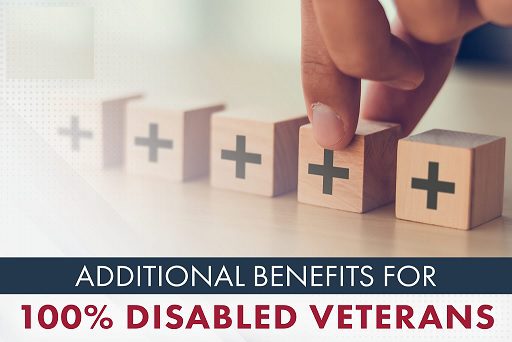
100 Percent Disabled Veteran Benefits Guide
A 100% disabled veteran is eligible for a variety of benefits aimed at providing financial support, healthcare, education, and other assistance.
Here’s a breakdown of some key benefits:
1. Financial Benefits:
- Disability Compensation: Monthly payments to compensate for the service-connected disability. The amount varies based on the severity of the disability and the number of dependents.
- Clothing Allowance: An annual allowance to replace clothes damaged due to a service-connected disability.
- Dental and Vision Care: Comprehensive dental and vision care at no cost.
- Property Tax Exemption: Many states offer property tax exemptions for 100% disabled veterans.
2. Healthcare Benefits:
- VA Health Care: Free access to healthcare services at VA medical facilities, including:
- Preventative care
- Primary care
- Specialty care
- Mental health services
- Home health care
- Geriatrics and extended care
- Medical equipment and prosthetic items
- Nursing home placement
- Medically related travel benefits
- CHAMPVA: If the veteran’s dependents are not eligible for TRICARE, they may qualify for CHAMPVA, which provides health insurance coverage through private healthcare providers.
3. Education Benefits:
- Vocational Rehabilitation and Employment: Assistance with job training, job seeking skills, resume development, and other employment services.
- Post-Secondary Education: Financial assistance for college, vocational, technical, or business school.
- Dependents’ Educational Assistance: The veteran’s spouse and children may be eligible for educational benefits, including financial assistance for college and vocational training.
4. Property Tax Waiver
100 percent permanently and totally disabled veterans, veterans who are entitled to veterans benefits at the 100 percent rate or un-remarried surviving spouses may request a property tax waiver. Form 5107, State Tax Commission Affidavit for Disabled Veterans Exemption (michigan.gov) and supporting evidence must be filed annually with the local government office issuing their property tax bill (city, village, township, etc.) after January 1 and before December 31 during the year in which the exemption is requested.
In order to be eligible for the exemption, the disabled veteran must have been honorably discharged from the armed forces of the United States. They must be a Michigan resident. Additionally, they must meet one of the following criteria:
- Has been determined by the VA to be permanently and totally disabled as a result of military service and entitled to veterans benefits at the 100 percent rate.
- Has a certificate from the VA, or its successors, certifying that he or she is receiving or has received pecuniary assistance due to disability for specially adapted housing.
- Has been rated by the VA as individually unemployable.
5. Other Benefits:
- Home Loan Guaranty: The VA can guarantee a portion of a home loan, making it easier for veterans to obtain a mortgage with favorable terms.
- Burial and Plot Allowance: Assistance with burial expenses and a plot in a national cemetery.
- Commissary and Exchange Privileges: Access to tax-free shopping at military commissaries and exchanges.
- Federal Hiring Preference: Veterans receive preference in hiring for federal jobs.
Important Notes:
- Eligibility: To be eligible for these benefits, the veteran must have a service-connected disability rating of 100%.
- Application Process: Veterans need to apply for each benefit separately. The VA website (www.va.gov) provides detailed information on the application process for each benefit.
- Updates and Changes: Benefits and eligibility criteria can change, so it’s important to stay updated by checking the VA website or contacting a Veterans Service Officer.
Additional Resources:
- VA Website: www.va.gov
- Hill & Ponton, P.A.: The 2024 Benefits List for Veterans and Dependents
- State of Michigan: Benefits for 100 Percent Disabled Veterans
- Nashville.gov: ADDITIONAL BENEFITS WHEN RATED 100% DISABLED BY THE VA